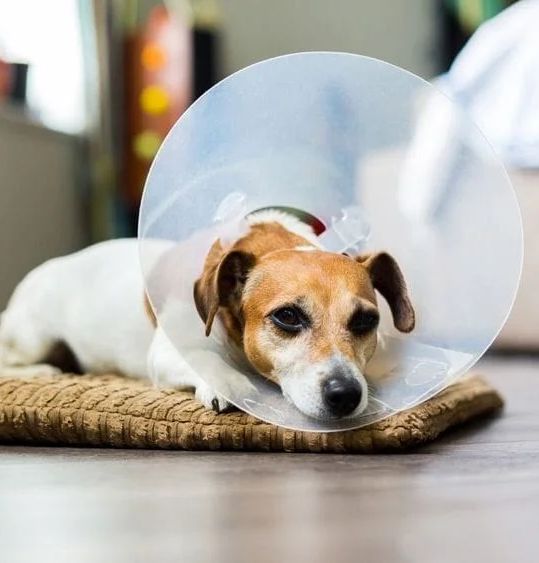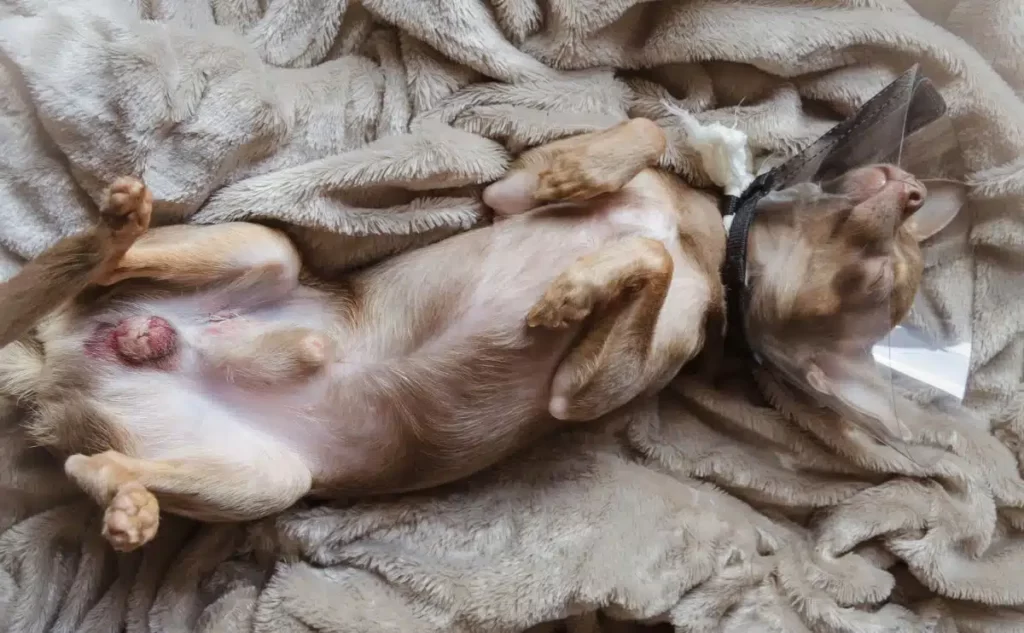
As a seasoned veterinarian, I often encounter various health issues in dogs, but one that requires particular attention is canine cryptorchidism, commonly known as an undescended testicle.
This condition, while not immediately life-threatening, can lead to significant health complications if left unaddressed. My aim is to shed light on this condition and its implications for your beloved canine companion.
Cryptorchidism in dogs occurs when one or both testicles fail to descend into the scrotum. Typically, this descent should happen by the time a puppy is two months old. When a testicle remains undescended, it is usually retained in the abdomen or the inguinal canal.
This condition is seen in various breeds and can be either:
- unilateral (one testicle) or
- bilateral (both testicles).
The primary concern with an undescended testicle is the increased risk of testicular cancer. Studies have shown that dogs with cryptorchidism are significantly more likely to develop tumors in the retained testicles compared to those with normal testicular descent.
Moreover, these undescended testicles are also prone to torsion or twisting, which is not only painful but can also lead to serious complications if not treated promptly.
As a veterinarian, I recommend surgery as the most effective treatment for cryptorchidism. The procedure, known as orchiectomy or neutering, involves the removal of the undescended testicle(s).
This not only eliminates the risks associated with the condition but also contributes to the overall health and behavior management of your pet.
Understanding the implications of canine cryptorchidism is crucial for pet owners. Early detection and prompt veterinary intervention are key to ensuring the health and well-being of your dog.
Regular check-ups and being vigilant for any abnormalities in your puppy’s development are essential steps in proactive pet care.
In the following sections, we will delve into the factors influencing the cost of this surgery, average cost estimates, and financial options available to you. As a pet owner, being informed about these aspects is as important as understanding the condition itself.

Contents
Factors Influencing the Cost of Canine Cryptorchidism Surgery
The cost of surgery for a dog’s undescended testicle can vary widely based on several factors. As a veterinarian, I understand that pet owners are concerned about the financial aspect of their dog’s healthcare.
Here, I’ll discuss the key elements that influence the cost of this surgery, helping you to better anticipate and prepare for the expenses involved.
Geographic Location:
The region or state you live in can significantly affect veterinary costs. Typically, urban areas with a higher cost of living may have higher veterinary fees compared to rural areas.
Veterinarian Experience and Clinic Reputation:
The expertise of the veterinarian performing the surgery can impact the cost. Surgeons with extensive experience or specializations in canine surgery might charge more. Additionally, the reputation and facilities of the clinic or hospital can also play a role in determining the price.
Severity and Complexity of the Case:
The cost can vary depending on how complicated the surgery is. For instance, if the undescended testicle is deeply lodged or the dog has other health issues, the surgery might require more time and resources, thereby increasing the cost.
Type of Surgery:
There are different surgical methods to address cryptorchidism. Traditional open surgery may be less expensive compared to laparoscopic surgery, which is less invasive and typically offers a faster recovery but may cost more due to the specialized equipment and expertise required.
Additional Costs:
Don’t forget to consider the costs beyond the surgery itself. These can include pre-surgery bloodwork, anesthesia, post-surgery care, pain management, and any follow-up visits or treatments. These additional costs can add up and should be factored into your overall budget.
It’s crucial for pet owners to discuss these factors with their veterinarian to get a clearer picture of the expected costs. Every dog’s situation is unique, and the cost can vary significantly from one case to another. In the next section, we will explore average cost estimates for this surgery across the United States, providing a general financial guideline for what you might expect.
Average Cost Estimates for Canine Cryptorchidism Surgery
| Phase | Service | Price in US$ |
|---|---|---|
| Pre-Surgical | Initial Consultation | $50 – $100 |
| Pre-Surgical | Diagnostic Imaging (Ultrasound/X-Ray) | $100 – $250 |
| Pre-Surgical | Comprehensive Blood Work | $80 – $200 |
| Pre-Surgical | Cardiac Evaluation (if necessary) | $200 – $500 |
| Surgery | Anesthesia | $100 – $300 |
| Surgery | Cryptorchidism Surgery (Standard/Laparoscopic) | $500 – $2,000 |
| Surgery | IV Fluids and Monitoring | $50 – $150 |
| Post-Surgical | Overnight Hospitalization (if required) | $100 – $400 |
| Post-Surgical | Pain Management and Medications | $30 – $100 |
| Post-Surgical | Post-operative Check-up and Suture Removal | $50 – $150 |
| Post-Surgical | Emergency Care (in case of complications) | Variable |
| Total Estimated Cost Range | $1,160 – $4,150+ | |
When considering surgery for your dog’s undescended testicle, understanding the potential financial implications is crucial. The total cost of this procedure can vary significantly based on numerous factors. Here, we present an overview of the average cost estimates, derived from national averages and surveys, to help you prepare for what lies ahead.
Pre-Surgical Costs
The journey typically begins with an initial consultation, which can range from $50 to $100. This is where your vet will assess your dog’s condition and discuss the necessary steps. Often, diagnostic imaging such as ultrasound or X-ray, priced between $100 and $250, is required to locate the undescended testicle.
Comprehensive blood work, which can cost $80 to $200, is also a standard pre-surgical procedure to ensure your dog is fit for anesthesia and surgery. In some cases, particularly for older dogs or breeds prone to cardiac issues, a cardiac evaluation might be necessary, adding another $200 to $500 to your bill.
Surgical Costs
The surgery itself, which can be performed using standard or laparoscopic techniques, is the most significant expense, ranging from $500 to $2,000.
This price variation depends on the complexity of the procedure and the method chosen. Anesthesia is another critical component, typically costing between $100 and $300. Additionally, IV fluids and monitoring during the surgery can add $50 to $150 to the overall cost.
Post-Surgical Costs
Post-surgical care is just as important as the procedure itself. If overnight hospitalization is required, this could cost an additional $100 to $400. Pain management and medications for recovery are usually in the range of $30 to $100.
A follow-up visit and suture removal can add another $50 to $150 to your total expenses. It’s also essential to consider the potential costs of emergency care, which can vary greatly if complications arise.
Cost Variations Across the U.S.
It’s important to note that these costs can vary depending on your location. For instance, in major urban centers like New York City or Los Angeles, veterinary costs tend to be higher compared to smaller cities or rural areas.
In San Francisco, for example, the cost for cryptorchidism surgery could lean towards the higher end of our estimates, reflecting the city’s overall higher cost of living. Conversely, in cities like Omaha or Tulsa, you might find the costs to be more moderate.
To sum up, the total estimated cost for a dog’s undescended testicle surgery can range broadly from approximately $1,160 to $4,150 or more, depending on various factors and potential complications. These figures are meant to serve as a guide, helping you to understand the possible financial commitment.
We strongly recommend discussing with your veterinarian for a more accurate estimate tailored to your dog’s specific needs. Remember, while the cost is a significant factor, the wellbeing and health of your furry friend are of utmost importance.
The Importance of Early Detection in Canine Cryptorchidism
Early detection plays a pivotal role in managing canine cryptorchidism effectively. As a veterinarian, I cannot stress enough the importance of regular veterinary check-ups in identifying and addressing health issues like undescended testicles in dogs at an early stage. Detecting cryptorchidism early not only enhances the chances of a successful treatment but can also significantly reduce the potential complications and associated costs.
Why Early Detection Matters
Cryptorchidism, if left untreated, can lead to serious health risks for your dog, including an increased likelihood of testicular cancer and the possibility of torsion, where the undescended testicle twists, causing acute pain and potentially life-threatening complications. Early detection allows for timely intervention, often when the procedure is less complex and the dog is in a better state of health to undergo surgery.
The Role of Regular Veterinary Check-Ups
Regular veterinary visits are key to early detection. During routine examinations, a veterinarian can check for the presence and position of the testicles, especially in puppies. This is crucial since cryptorchidism is typically identifiable by the time a dog is two months old. In these check-ups, if an undescended testicle is suspected, further diagnostic steps can be taken immediately.
It’s important to note that cryptorchidism may not be easily detectable to the untrained eye, especially in cases where the testicle is located in the abdomen. Therefore, having a professional evaluation is essential.
Cost Benefits of Early Treatment
Addressing cryptorchidism at an early stage can also be more cost-effective. If the condition is identified before it leads to further health complications, the surgery and recovery process tend to be more straightforward, potentially reducing the need for more complex and costly procedures. For instance, a simple orchiectomy performed at a young age might be less invasive and require less post-operative care compared to a situation where the dog has developed complications due to delayed treatment.
Moreover, early treatment can prevent the need for additional interventions related to complications that can arise from an untreated condition, such as cancer treatment or emergency care for torsion.

Conclusion About Surgery for a Dog’s Undescended Testicle Cost
Navigating the complexities of canine cryptorchidism, from understanding the condition to managing its financial aspects, is a journey that requires careful consideration and informed decision-making. As we’ve discussed, the costs associated with treating this condition can vary widely based on numerous factors, including the severity of the case, the type of surgery required, and the location of your veterinary clinic. Yet, the health and well-being of your furry companion should always be the priority.
Regular veterinary check-ups and early detection not only contribute to better health outcomes but can also be more economical in the long run. As a responsible pet owner, staying vigilant and proactive in your dog’s health care is imperative.
We hope this article has provided you with valuable insights and guidance on the costs and considerations for surgery in cases of undescended testicles in dogs.
Your experiences, questions, or additional tips are always welcome, so please feel free to share them in the comments section below. Together, we can create a supportive community for pet lovers, ensuring the best care for our four-legged friends.
